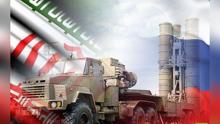
Paris’s position on the S-300 issue is even stranger — that the sale could jeopardize the establishment of “safe corridors” for protecting civilians and sending humanitarian supplies into Syria. Does that mean France is planning on introducing safe corridors outside UN auspices? What about respect for the UN Charter and international law? It turns out that Paris is increasingly embracing principles of unilateral diplomacy that even the United States has abandoned. Meanwhile, in Israel we are hearing alarming statements from Foreign Minister Moshe Yaalon, who said the Israelis would know what to do if Syria gets S-300s. He was obviously referring to the airstrikes Israel carried out in early May under the pretext of preventing Syria from providing weapons to the Lebanese Hezbollah.
The most radical EU countries — primarily Great Britain and France — are trying to move up arms shipments to the Syrian opposition, although it was agreed in Brussels that the process would not begin before August 1 in order to give the United States and Russia a chance to work things out for the Geneva 2 conference, which is supposed to bring the Bashar al-Assad government and a delegation of the Syrian opposition’s Coalition Council to the negotiating table. The initial results from the conference should be known by then. However, London and Paris decided to jump the gun, saying they were prepared to begin arming the rebels almost immediately. For example, French Foreign Ministry spokesman Philippe Lalliot said it will depend on “the evolution of the situation on the ground, the evolution within the opposition and the diplomatic evolution.” Foreign Office head William Hague said bluntly that he could not rule out starting to arm the opposition before August 1. Even as a unilateral move, it would doubtless create serious friction within the European Union. Then the EU would again come across as conducting a flawed foreign policy long — especially given the willingness of London and Paris to supply not just ammunition, but armored vehicles, night vision devices, and small arms, which are by no means “nonlethal.” Bullets kill and APCs are heavy weapons, especially when equipped with machine guns.
The restraint shown by most European Union countries is understandable — they are well aware that EU weapons could easily make their way from “moderate” opposition units to terrorist groups like Jabhat al-Nusra, and Islamist extremists could then use them against Israel. Even worse — they could be returned to the European countries and used against those who supplied arms to the Syrian rebels. But France and Britain are chomping at the bit and clearly are refusing to understand. Their chief goal is to unseat Assad at any cost and demonstrate their loyalty to their economies’ major investors — Qatar and Saudi Arabia. Indeed, we need only see how much these two Wahhabi monarchies have invested in Great Britain and France since the start of the Arab Spring to gain their support, both as key members of NATO and the EU and as permanent members of the UN Security Council. They cannot put much pressure on the United States, after all, but Russia and China, which have virtually no investments from Qatar and Saudi Arabia, are another story. Qatari and Saudi money in London and Paris is now paying off.
By and large, however, lifting the EU embargo and arming the opposition in Syria will only add fuel to the flames and force Russia, Iran and Syria’s other friends to step up their military aid to Damascus. So the decision will only cause the conflict to escalate. In the final analysis, Syria’s neighbors will suffer, including Israel, whose security is unlikely to be enhanced by an Islamist victory in Syria, as well as Turkey, Jordan and Lebanon, which will be flooded by more refugees. So the Middle East will not benefit from the political ambitions of London and Paris. Instead, we should expect to see Qatar and Saudi Arabia make generous new investments in the economies of these two European countries. As the saying goes, however, no good can come from evil. Especially since both countries have large Islamist communities that feel disadvantaged. London has already suffered terrorist attacks by domestic Islamists. Has Paris forgotten that immigrants from Arab and Islamic countries make up almost 10% of France’s population? As they say, “You reap what you sow.”
They may end up kicking themselves for their shortsightedness.
Alexander Orlov is a political analyst and an expert Orientalist. Exclusively for New Eastern Outlook
